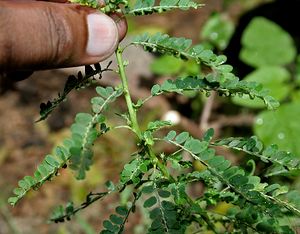Note: This is a project under development. The articles on this wiki are just being initiated and broadly incomplete. You can Help creating new pages.
Difference between revisions of "Phyllanthus amarus - Bhuamlaki"
m (Jayashree moved page Phyllanthus amarus to Nela nelli) |
|||
| Line 1: | Line 1: | ||
[[File:Phyllanthus amarus (Carry Me Seed) W IMG 3854.jpg|thumb|right|''nela nelli'', ''Black catnip'', ''Phyllanthus amarus'']] | [[File:Phyllanthus amarus (Carry Me Seed) W IMG 3854.jpg|thumb|right|''nela nelli'', ''Black catnip'', ''Phyllanthus amarus'']] | ||
| + | '''Phyllanthus amarus''' is widely used as a medicinal plant. An infusion is considered a good tonic, diuretic and antipyretic. A decoction of the aerial parts or only of the leaves is taken to treat gonorrhoea, diarrhoea, dysentery, stomach-ache, pain in the sides, haemorrhoids and absence of menstruation or female sterility. A suppository of the leaf paste is applied to the vagina to treat absence of menstruation and polyps. Leaf sap, mixed with palm oil or not, is applied as ear drops to treat otitis and applied to abscesses, sores and wounds.<ref name="uses"/> | ||
| − | + | == References == | |
| + | |||
| + | <references> | ||
| + | <ref name="uses">[http://www.prota4u.org/protav8.asp?p=Phyllanthus+amarus "Phyllanthus amarus"]</ref> | ||
| + | </references> | ||
[[Category:Herbs]] | [[Category:Herbs]] | ||
Revision as of 11:12, 3 January 2017
Phyllanthus amarus is widely used as a medicinal plant. An infusion is considered a good tonic, diuretic and antipyretic. A decoction of the aerial parts or only of the leaves is taken to treat gonorrhoea, diarrhoea, dysentery, stomach-ache, pain in the sides, haemorrhoids and absence of menstruation or female sterility. A suppository of the leaf paste is applied to the vagina to treat absence of menstruation and polyps. Leaf sap, mixed with palm oil or not, is applied as ear drops to treat otitis and applied to abscesses, sores and wounds.[1]
